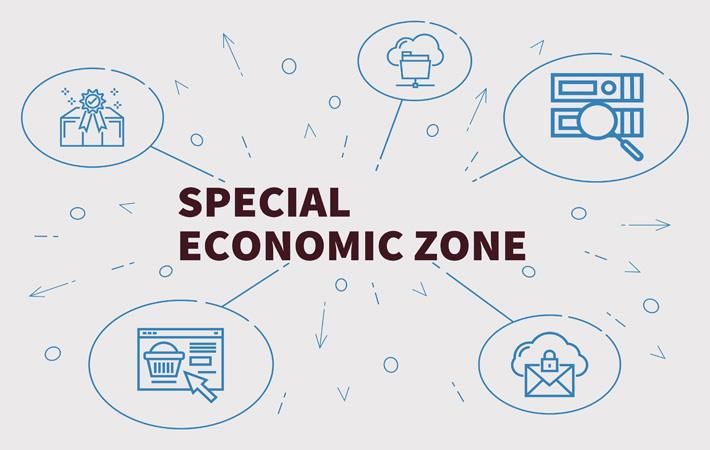The Central Government of Narendra Modi led BJP party has decided to make a few changes in the industrial aspects.
As it examines the need for new legislation to refurbish the country’s Special Economic Zones (SEZ), the Centre could discard the proposed Development of Enterprise and Service Hubs (DESH) Bill, according to a report by The Economic Times (ET).
)
What is the Special Economic Zones (SEZ) Act?
A Special Economic Zone (SEZ) is an area in a country that is designed to generate positive economic growth.
An SEZ is normally subject to different and more favourable economic regulations compared to other regions in the same country, including tax incentives and the opportunity to pay lower tariffs. SEZ economic regulations tend to be conducive to—and attract—Foreign Direct Investment (FDI).
Special economic zones are special areas designated within a country that have different business and trade regulations. They are normally established to facilitate rapid economic growth and development in certain geographic regions.
 Shutterstock
Shutterstock
Economic growth may come locally, regionally, and/or internationally. The growth that results from special economic zones is accomplished by leveraging tax incentives as a way of attracting foreign dollars through FDI and technological advancement.
SEZs may increase export levels for the implementing country and other countries that supply it with intermediate products.
Types of Special Economic Zones (SEZs)
- Free-Trade Zone: Free Trade Zones are specially secured areas that are designated for the processing of imported and exported goods. Also called commercial-free or foreign-trade zones, these areas involve special customs procedures and duty-free treatment.
- Export Processing Zone: These zones are generally meant for commercial and industrial exports. The goal is to encourage economic growth through foreign investment. Export processing zones offer certain benefits, such as tax and import duty exemptions, and little to no barriers.
- Industrial Park: As the name suggests, industrial areas or parks are designed to be used for industrial instead of commercial or residential purposes. Tax-related incentives are common benefits for those that use these special zones.
- Specialised Zone: Some of the most common uses for these areas include technology hubs, airport-based zones, and logistics parks.

What was the central government proposed Development of Enterprise and Service Hubs (DESH) Bill?
Finance minister Nirmala Sitharaman announced the DESH Bill in the Union Budget in February 2022. The DESH Act is meant to replace the Special Economic Zones Act and allows states to participate in the development of enterprise and service hubs.
The government seeks to rekindle interest in SEZs and foster more inclusive economic hubs through the DESH initiative. Explaining the rationale behind this new law, Commerce Secretary BVR Subrahmanyam previously stated that the country requires large industrial manufacturing zones equipped with world-class infrastructure to transform them into future manufacturing hubs.
The initial draft of the DESH Bill proposed to eliminate the primary requirement for an SEZ unit to maintain a positive net foreign exchange (NFE) for five years. However, it is expected that this requirement will change to assessing the unit’s performance based on Net Positive Growth (NPG) under the proposed Bill. NPG will be determined by various parameters, including employment generation and economic activity.

Finance minister Nirmala Sitharaman (File pic: SANSAD TV/PTI)
Why does the Central Government want to make the changes?
“We are still evaluating and everything is on the table. Whether it will be DESH bill or amending the SEZ Act or some new format, the modalities are being discussed,” said an official.
Another person in the know said that the commerce department is working on a cabinet note on the proposed amendments to the SEZ Act.
The amendment would address the concerns and long-standing demand for SEZs to be allowed to sell in the domestic market and that all duties foregone on raw materials should be paid back and must also be accommodated.
The existing SEZ Act was implemented in 2006 with an aim to create export hubs and boost manufacturing in the country. However, these enclaves started losing their sheen after imposition of minimum alternate tax and introduction of sunset clause for the withdrawal of tax incentives.
)
The DESH Bill was necessitated to woo investors after the government set a sunset date for SEZ units to start operations (June 30, 2020) to be eligible for a phased income tax holiday for 15 years.
This dampened the appeal of SEZs that were once touted to be the key engine of India’s export growth. Sensing this, the commerce ministry had incorporated the benign tax and some other provisions in the draft DESH Bill to redraw investors into these hubs.
Moreover, India lost a case at the World Trade Organisation (WTO) filed by the US, which had claimed New Delhi was offering illegal export subsidies through these SEZs. A modern framework for such hubs was also required to boost industrialisation, in sync with global best practices.


 Shutterstock
Shutterstock 









